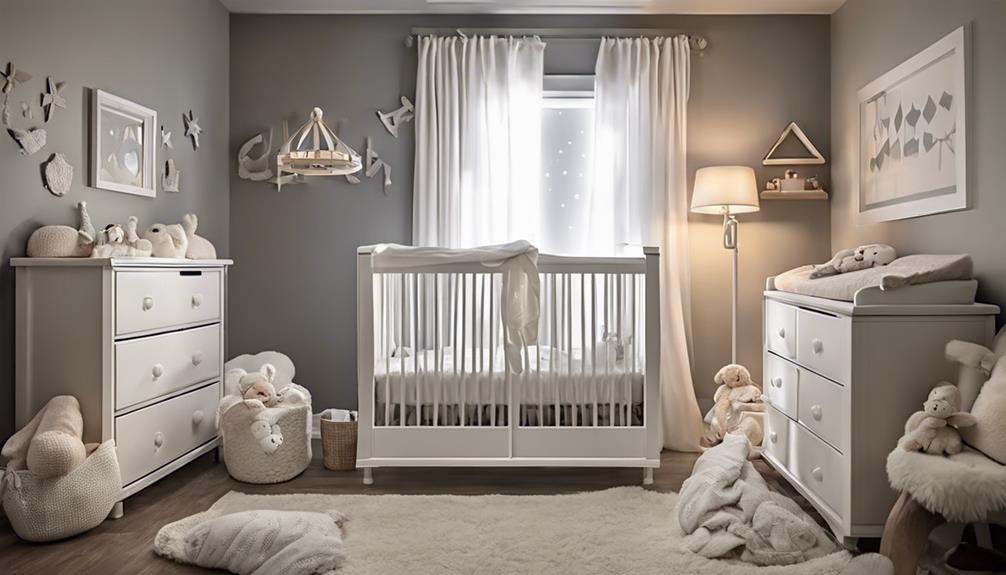As caregivers, it is estimated that around 70% of newborns have difficulty sleeping during their initial months of life.
When our little ones won't settle down at night, it can be challenging to find effective solutions.
However, there are three key strategies that can help improve their sleep patterns and guarantee a more peaceful night for the whole family.
By implementing these simple yet effective techniques, you can set the stage for better sleep habits and a more restful night for your newborn.
Key Takeaways
- Establish consistent bedtime routines to enhance sleep quality and create a calming environment.
- Create a calm sleep environment with factors like dark rooms, white noise, and ideal room temperature.
- Address any underlying sleep issues promptly to prevent disruptions in nighttime rest.
- Promote healthy sleep habits through predictable routines, soothing environments, and seeking professional advice when needed.
Establishing a Consistent Bedtime Routine
Creating a soothing bedtime routine for your newborn can greatly enhance their sleep quality and help establish healthy sleep habits. It's important to understand your baby's sleep pattern and work around it to make sure they get the recommended hours of sleep. Making sure your baby has a consistent sleep schedule can help them sleep for longer stretches at night. By following a soothing bedtime routine, you can assist your baby in falling asleep more easily and develop good sleep habits.
One common reason babies wake up frequently during the night is the lack of a predictable bedtime routine. By establishing a consistent routine, you can signal to your baby that it's time for sleep, promoting better sleep patterns. This predictability can also help your baby self-soothe and create a calming environment for them to drift off to sleep. Remember, a bedtime ritual isn't just about the actions you take but also about the sense of security and comfort it provides to your little one.
Creating a Calm Sleep Environment

To guarantee your newborn sleeps soundly at night, consider creating a serene sleep environment that promotes relaxation and tranquility. Ensuring your baby has a calming space to rest can make a significant difference in their sleep quality. Here are some practical tips to help you set up the perfect sleep environment for your little one:
- Keep the room dark: Utilize blackout curtains to create a dark environment that encourages better sleep associations.
- Use white noise: Employ a white noise machine to mask external noises and provide a soothing background for your baby's sleep.
- Maintain room temperature: Keep the room temperature between 68-72 degrees Fahrenheit to provide optimum sleep conditions for your baby.
- Choose a firm mattress: Guarantee the crib or bassinet has a firm mattress to offer a safe and supportive sleeping surface for your little one.
Addressing Underlying Sleep Issues

Addressing hunger cues promptly can prevent night wakings in newborns, ensuring a more restful sleep for both baby and parents. Sometimes, discomfort factors like teething or gas can disrupt a newborn's sleep. By identifying and managing these issues, you can help improve your baby's nighttime rest.
Creating a soothing sleep environment with white noise and dim lighting can also aid in promoting better sleep for your little one. Additionally, establishing a consistent bedtime routine can signal to your newborn that it's time to sleep, encouraging healthy sleep habits.
If you find that your newborn is still struggling with sleep, it may be beneficial to seek professional advice. Consulting with a pediatrician or a sleep specialist can help you address any underlying sleep issues your baby may be experiencing. These experts can provide tailored guidance and support to help improve your newborn's sleep patterns, ensuring both you and your baby get the rest you need.
Frequently Asked Questions
What Can Make a Newborn Baby Not to Sleep at Night?
Sometimes newborns struggle to sleep at night due to hunger, discomfort, shorter sleep cycles, or day-night confusion. We can help by addressing these issues with feedings, comfort, and a soothing environment to encourage better sleep.
How Do I Get My Newborn to Sleepless Nights?
We comprehend the struggle of soothing a newborn to sleep. Implementing calming routines, creating a sleep-friendly environment, swaddling for comfort, addressing discomfort promptly, and seeking pediatrician guidance are key steps to guarantee peaceful nights for your little one.
How Can I Get My Newborn to Sleep Through the Night?
We found that establishing a consistent bedtime routine, ensuring your baby is well-fed, creating a calming sleep environment, swaddling for security, and monitoring sleep patterns for adjustments helped our newborn sleep through the night.
What Causes Sleepless Nights in Newborns?
Newborns experience sleepless nights due to their small stomach capacity, immature circadian rhythms, discomfort from gas, teething, or growth spurts, shorter sleep cycles, and environmental factors like temperature, noise, or light. It's tough for them, but we can help.
What Are Some Effective Methods to Help a Newborn Sleep Better at Night?
Establish a bedtime routine to help your baby sleep. Swaddling, white noise, and a consistent sleep environment can also help your baby sleep better. Pay attention to your baby’s sleep cues and create a calming environment to help your baby sleep more soundly.
Conclusion
So there you have it, folks! Just follow these simple tips and your newborn will be sleeping like a baby in no time.
Remember, sleepless nights are just a phase, but with a little patience and some clever tricks, you'll be back to getting your beauty sleep in no time.
Sweet dreams, parents!









